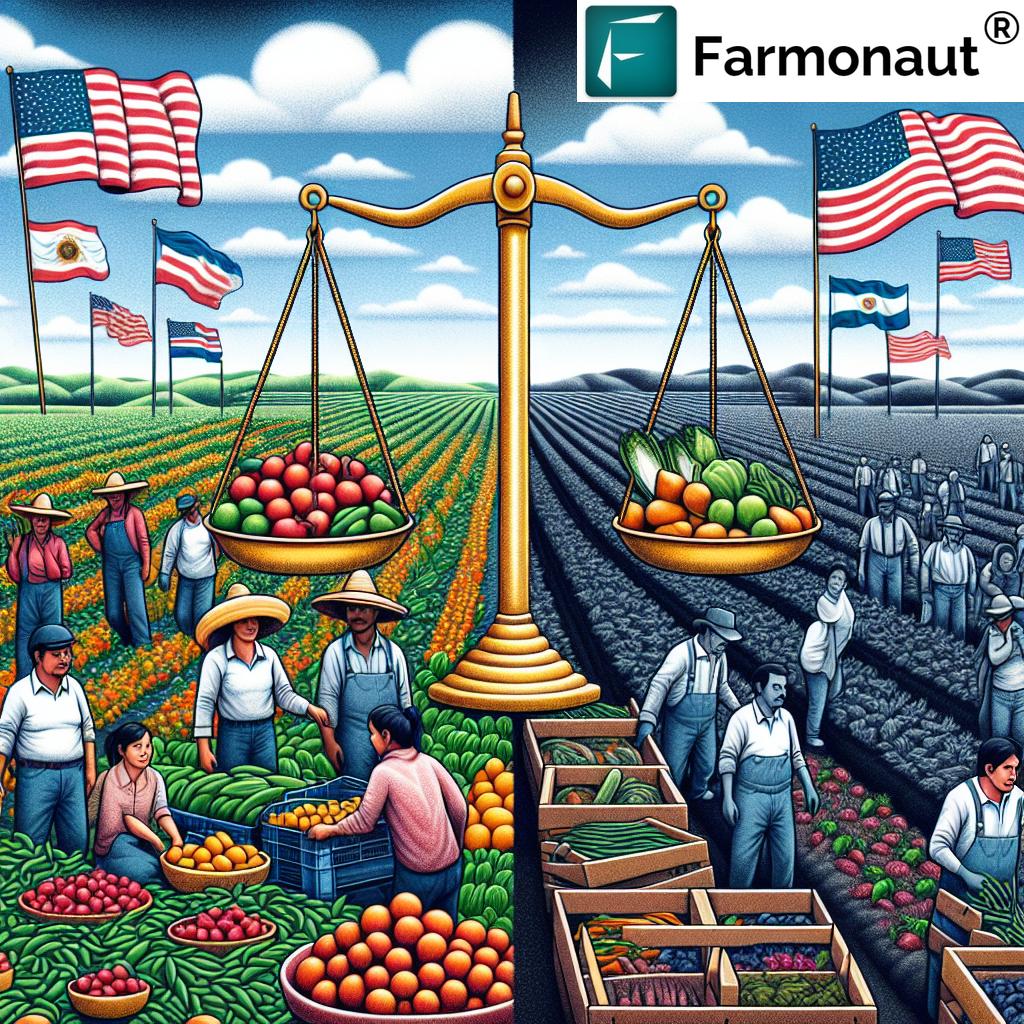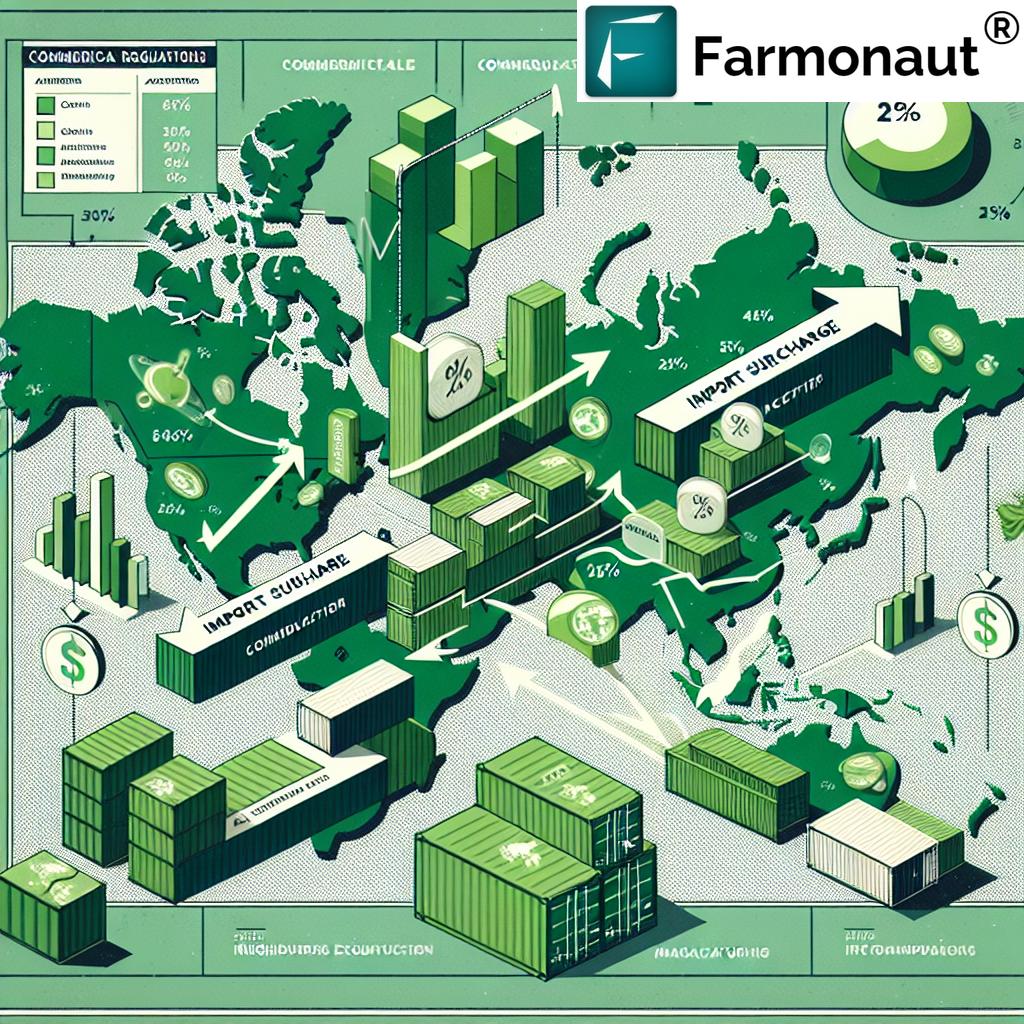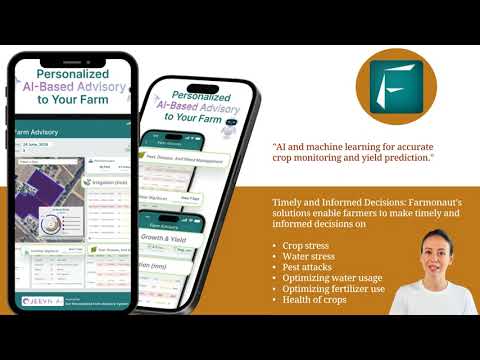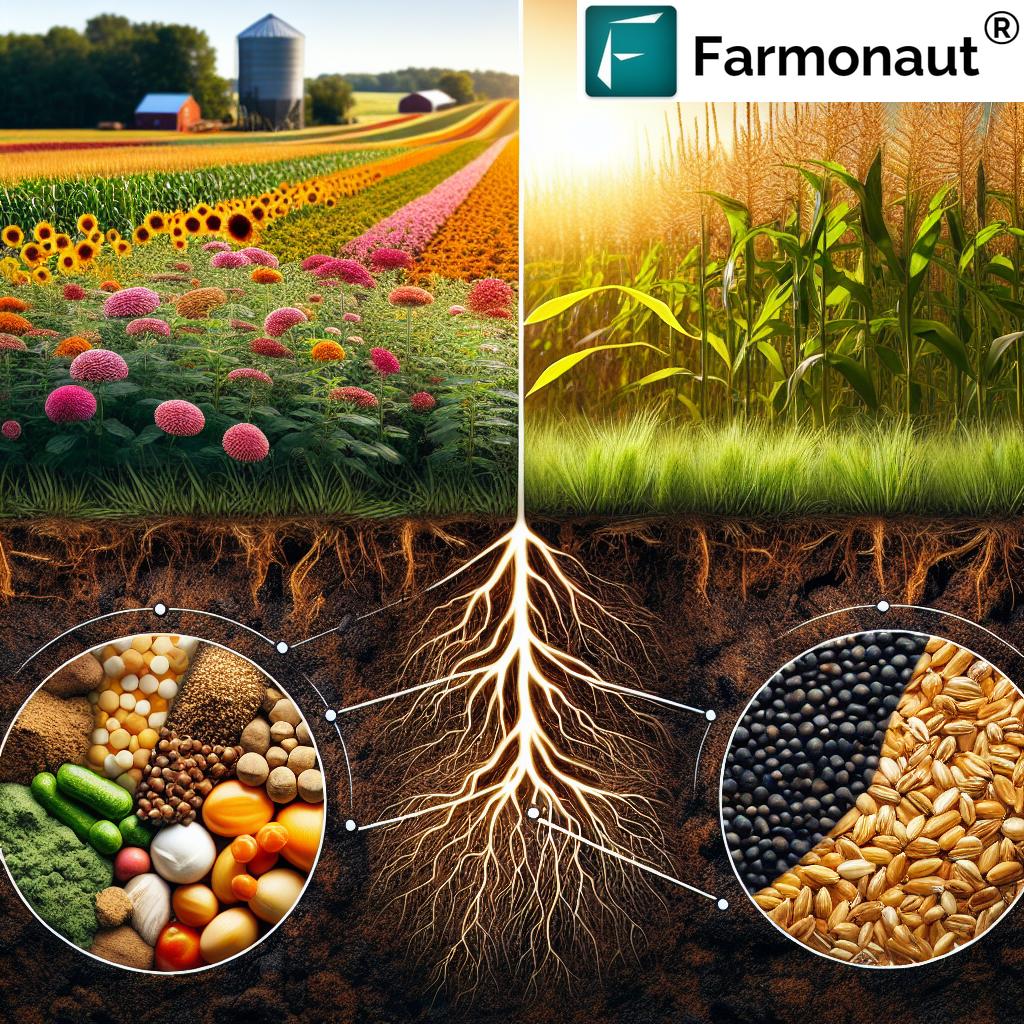Farmonaut Insights: How US Immigration and Trade Policies Impact Agricultural Labor and Food Prices

“A proposed 25% import surcharge on goods from China, Canada, and Mexico could significantly impact US trade relations and consumer prices.”
In recent months, the landscape of US immigration and trade policies has undergone significant changes, sparking intense debates about their potential impacts on various sectors of the economy. As experts in agricultural technology and satellite-based farm management, we at Farmonaut have been closely monitoring these developments and their implications for the agricultural sector. In this comprehensive analysis, we’ll explore how these new policies are reshaping the agricultural labor market and influencing food prices across the United States.
The Changing Face of US Immigration Policy
The implementation of stricter immigration policies has sent ripples through various industries, with agriculture feeling the effects most acutely. These policies aim to reduce illegal immigration and tighten border control, but they also have far-reaching consequences for the US economy, particularly in sectors heavily reliant on immigrant labor.
- Labor Shortage Concerns: Many agricultural businesses, especially those involved in labor-intensive crops like fruits and vegetables, have long depended on immigrant workers. The new policies threaten to exacerbate existing labor shortages in these areas.
- Wage Pressures: As the pool of available workers shrinks, farms and agricultural businesses may be forced to increase wages to attract and retain workers, potentially leading to higher production costs.
- Seasonal Worker Programs: Changes to programs like H-2A, which allows for temporary agricultural workers, could further complicate the labor situation for many farms.
At Farmonaut, we recognize the critical role that labor plays in agricultural productivity. Our satellite-based crop monitoring system can help farmers optimize their operations and make more efficient use of available labor resources. Learn more about our solutions by visiting our web app.
Trade Policies and Their Economic Implications
Alongside immigration reforms, recent executive orders have introduced significant changes to US trade policies, most notably a 25% import surcharge on goods from China, Canada, and Mexico. This move has far-reaching implications for various sectors of the economy, including agriculture.
- Rising Input Costs: The surcharge is likely to increase the cost of imported agricultural inputs, machinery, and technology, potentially raising production costs for US farmers.
- Export Challenges: Retaliatory measures from affected countries could harm US agricultural exports, impacting farmers who rely on international markets.
- Supply Chain Disruptions: The new tariffs may lead to disruptions in established supply chains, forcing businesses to seek alternative sources or pass increased costs onto consumers.
To help farmers navigate these challenges, Farmonaut offers advanced AI-driven advisory services through our Jeevn AI system. This tool provides personalized recommendations to optimize farm operations and adapt to changing market conditions. Explore our Android app or iOS app to access these features.

The Ripple Effect on Food Prices
“Recent US immigration policies may exacerbate labor shortages in agriculture, potentially affecting food production and prices for millions of Americans.”
The combined effect of stricter immigration policies and new trade tariffs is expected to have a significant impact on food prices across the United States. Here’s how these factors are likely to influence the cost of food for American consumers:
- Labor Costs: With a shrinking pool of agricultural workers, farms may need to increase wages, which could be reflected in higher food prices.
- Production Expenses: The import surcharge on goods from major trading partners may increase the cost of agricultural inputs, further driving up production costs.
- Supply Chain Adjustments: As businesses adapt to new trade realities, there may be temporary disruptions in supply chains, potentially leading to short-term price fluctuations.
- Reduced Competition: If some farms are unable to adapt to the new labor and trade landscape, it could lead to reduced competition in certain product categories, potentially resulting in higher prices.
At Farmonaut, we’re committed to helping farmers navigate these challenges. Our satellite-based crop health monitoring system can help optimize resource use and improve yields, potentially offsetting some of the increased costs. Learn more about our API services at Farmonaut Satellite API.
Impact on US-Canada Relations
The new trade policies have particularly strained relations between the US and Canada, two countries with historically strong economic ties. The implementation of the 25% import surcharge on Canadian goods has led to significant tension and potential economic repercussions for both nations.
- Cross-Border Trade: The surcharge may disrupt the flow of goods between the two countries, affecting industries on both sides of the border.
- Agricultural Exports: Canadian farmers exporting to the US market may face challenges, potentially leading to retaliatory measures that could harm US agricultural exports to Canada.
- Economic Interdependence: The policies highlight the deep economic ties between the two countries and the potential for policy changes to have far-reaching effects on both economies.
Farmonaut’s blockchain-based traceability solutions can help maintain transparency in cross-border agricultural trade, potentially easing some of the tensions arising from these policy changes. Explore our developer documentation at Farmonaut API Docs.
Global Trade Tensions and US Manufacturing
The implementation of the 25% import surcharge extends beyond Canada to include China and Mexico, two of the United States’ largest trading partners. This move has significant implications for global trade dynamics and US manufacturing:
- Supply Chain Disruptions: US manufacturers relying on inputs from these countries may face higher costs and potential supply chain disruptions.
- Retaliatory Measures: There’s a risk of countermeasures from affected countries, which could harm US exports across various sectors, including agriculture.
- Reshoring Incentives: The tariffs may encourage some manufacturers to bring production back to the US, potentially creating new job opportunities but also increasing production costs.
Farmonaut’s fleet and resource management tools can help agricultural businesses optimize their operations in the face of these trade challenges. Our solutions can assist in managing logistics more efficiently, potentially mitigating some of the increased costs associated with the new trade policies.
Economic Impact of Deportation Policies
The intensified focus on deportation as part of the new immigration policies has far-reaching economic implications, particularly for industries that have traditionally relied on immigrant labor:
- Labor Market Shifts: Sectors such as agriculture, construction, and hospitality may face significant labor shortages, potentially leading to wage increases and production delays.
- Consumer Spending: Reduced immigrant populations could lead to decreased consumer spending in certain areas, affecting local economies.
- Fiscal Impact: While reducing illegal immigration may decrease some public service costs, it could also reduce tax contributions from immigrant workers.
At Farmonaut, we understand the importance of adapting to these changing labor dynamics. Our AI-powered advisory system can help farmers optimize their operations and make the most efficient use of available labor resources.
Inflation Risks and Consumer Prices
The combination of stricter immigration policies and new trade tariffs introduces significant inflationary pressures into the US economy. Here’s how these factors could contribute to rising consumer prices:
- Labor Costs: As industries face labor shortages, wages are likely to increase, potentially leading to higher prices for goods and services.
- Import Prices: The 25% surcharge on imports from China, Canada, and Mexico is likely to increase the cost of many consumer goods.
- Production Costs: Higher input costs due to tariffs and increased wages may force businesses to raise prices to maintain profitability.
- Supply Chain Disruptions: Any disruptions in supply chains could lead to temporary shortages and price spikes for certain products.
Farmonaut’s satellite-based crop monitoring and AI advisory services can help farmers optimize their production processes, potentially mitigating some of these inflationary pressures in the agricultural sector.
Impact on Specific Agricultural Sectors
The effects of these policy changes are likely to vary across different agricultural sectors. Here’s a breakdown of potential impacts on key areas:
- Fruit and Vegetable Production: These labor-intensive crops are particularly vulnerable to worker shortages, potentially leading to reduced production and higher prices.
- Dairy Farming: The dairy industry, which relies heavily on immigrant labor for year-round operations, may face significant challenges in maintaining production levels.
- Grain Crops: While less labor-intensive, grain farmers may still feel the impact through increased equipment and input costs due to trade tariffs.
- Meat Processing: The meat processing industry, another sector with a high proportion of immigrant workers, may face labor shortages leading to potential supply disruptions.
Farmonaut’s technologies can assist farmers across these sectors in optimizing their operations and adapting to the changing labor and trade landscape.
Long-term Economic Implications
As we look beyond the immediate effects of these policy changes, it’s important to consider their potential long-term economic implications:
- Structural Changes in Agriculture: The industry may shift towards more mechanization and automation to compensate for labor shortages.
- Trade Relationship Shifts: Prolonged trade tensions could lead to permanent changes in global supply chains and trade patterns.
- Innovation and Adaptation: The challenges posed by these policies may spur innovation in farming techniques and technologies.
- Regional Economic Impacts: Areas heavily dependent on agriculture or immigrant labor may experience significant economic shifts.
At Farmonaut, we’re committed to supporting farmers through these changes with our advanced technological solutions. Our platform is designed to help agricultural businesses adapt and thrive in an evolving economic landscape.
Comparative Analysis: Impact of US Immigration and Trade Policies on Agricultural Sector
| Policy Area | Potential Impact on Labor | Effect on Food Prices | Long-term Economic Implications |
|---|---|---|---|
| 25% Import Surcharge | Minimal direct impact | Potential 5-10% rise in imported food prices | Shift towards domestic production, possible trade retaliation |
| Stricter Immigration Enforcement | Severe labor shortages in agriculture | Possible 15-20% increase in labor-intensive crop prices | Acceleration of farm automation, potential crop mix changes |
| Changes to Seasonal Worker Programs | Moderate to severe seasonal labor shortages | Seasonal price spikes for certain produce | Shift to less labor-intensive crops, increased mechanization |
| Trade Tensions with Canada/Mexico | Minimal direct labor impact | Potential 3-7% increase in specific imported foods | Reshaping of North American agricultural trade patterns |
| Deportation Policies | Significant reduction in available agricultural workforce | Possible 10-15% increase across various food categories | Structural changes in agricultural labor market, possible farm consolidations |
FAQs
- How will the 25% import surcharge affect food prices?
The surcharge is likely to increase the cost of imported foods and agricultural inputs, potentially leading to higher food prices for consumers. The exact impact will vary depending on the product and its reliance on imported components. - What sectors of agriculture are most affected by stricter immigration policies?
Labor-intensive sectors such as fruit and vegetable production, dairy farming, and meat processing are likely to be most affected due to their reliance on immigrant labor. - How might these policies impact small farms versus large agricultural businesses?
Small farms may struggle more with labor shortages and increased costs, while larger businesses might have more resources to adapt through mechanization or absorbing higher wages. - Could these policies lead to food shortages in the US?
While widespread food shortages are unlikely, there could be temporary supply disruptions and reduced availability of certain labor-intensive crops. - How can technology help farmers adapt to these policy changes?
Technologies like Farmonaut’s satellite-based crop monitoring and AI advisory systems can help farmers optimize their operations, potentially offsetting some of the challenges posed by labor shortages and increased costs.
Conclusion
The recent changes in US immigration and trade policies have set in motion a complex web of economic effects that are reshaping the agricultural landscape. From labor shortages to rising food prices, these policies present significant challenges for farmers, consumers, and the broader economy. However, they also create opportunities for innovation and adaptation within the agricultural sector.
At Farmonaut, we remain committed to supporting farmers through these changes with our cutting-edge satellite-based farm management solutions. By leveraging technology to optimize operations and improve efficiency, we believe that the agricultural sector can navigate these challenges and emerge stronger and more resilient.
As the situation continues to evolve, it will be crucial for policymakers, industry leaders, and technology providers to work together to address the challenges and harness the opportunities presented by these policy shifts. The future of US agriculture will depend on our collective ability to adapt, innovate, and collaborate in the face of these significant changes.
Earn With Farmonaut: Join our affiliate program and earn a 20% recurring commission by helping farmers save 10% with your promo code. Onboard 10 Elite farmers monthly to potentially earn $148,000+ annually. Start now and grow your income!
Farmonaut Subscriptions
Explore our subscription options to access Farmonaut’s advanced agricultural technologies and support your farm’s adaptation to the changing policy landscape.




















